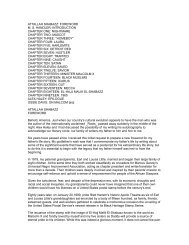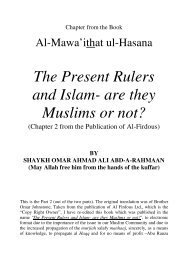Create successful ePaper yourself
Turn your PDF publications into a flip-book with our unique Google optimized e-Paper software.
It is ra<strong>the</strong>r interesting <strong>to</strong> see that for Philipson, a devout<br />
advocate for <strong>the</strong> revolutionary overthrow of Jewish values,<br />
Mendelssohn is <strong>to</strong>o religious a personality for him <strong>to</strong> swallow,<br />
which again bears out how insidious <strong>the</strong> llluminati were in<br />
advocating creeping changes in religion.<br />
Smolensken's evaluation is most perceptive, because he<br />
sees through <strong>the</strong> thin veil of Mendelssohn quite clearly. Even<br />
Christian writers immediately saw in <strong>the</strong> publication of<br />
Mendelssohn's Jerusalem that if Judaism had no dogmas but<br />
only laws, it was no religion, but only a political system.<br />
Schechter, Geiger's disciple; over one hundred years after<br />
Mendelssohn, and who was also a <strong>to</strong>ol of <strong>the</strong> Communist<br />
Conspiracy, decided he could even capitalize on this when he<br />
wrote an essay entitled The Dogma of Dogmalessness, in<br />
which he takes people such as Mendelssohn <strong>to</strong> task for<br />
claiming that Judaism has no dogmas. With such writings,<br />
Schechter hoped <strong>to</strong> ga<strong>the</strong>r around him and <strong>to</strong> find an attraction<br />
for more religious groups of Jews who would be enticed in<strong>to</strong><br />
fur<strong>the</strong>r "enlightenment." 40<br />
The question that remains is: "Is it possible <strong>to</strong> be a Jew and<br />
ignore dogma?" In <strong>the</strong> structure of Judaism, <strong>the</strong>re are among<br />
<strong>the</strong> 613 commandments of <strong>the</strong> Torah, philosophical<br />
commandments. Judaism is structured so that if a person were<br />
<strong>to</strong> mentally reject God or <strong>the</strong> dogma that <strong>the</strong> Torah is of Divine<br />
authority, that several Jewish laws will be violated, including<br />
prohibitions of idolatry and blasphemy, as, for example, in <strong>the</strong><br />
Book of Numbers where it is stated (15:31) "If a person has<br />
spurned <strong>the</strong> word of <strong>the</strong> Lord, that person should be cut off<br />
from his people." This means that <strong>to</strong> deny one word of <strong>the</strong><br />
Torah as being of Divine origin makes one culpable for this<br />
sin. Judaism does not differentiate between agnosticism and<br />
a<strong>the</strong>ism. To deny God's Torah is <strong>to</strong> deny God. 41 Fur<strong>the</strong>rmore,<br />
<strong>the</strong> Rabbis decreed that concerning three cardinal sins is<br />
death <strong>to</strong> be preferred over life. They are:<br />
65




